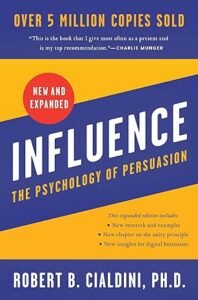
Hey there, fellow growth enthusiasts and self-improvement junkies! Today, we’re diving headfirst into the wild world of persuasion, manipulation, and why you keep buying stuff you don’t need. Buckle up, because we’re about to unpack “Influence: The Psychology of Persuasion” by Robert Cialdini, the book that’s been messing with people’s heads since 1984.
Now, I know what you’re thinking: “Great, another self-help book that’s going to tell me to visualize success and hug trees.” Well, hold onto your vision boards, folks, because this isn’t your average “believe in yourself” nonsense. This is the psychology equivalent of finding out how the magician saws the lady in half – except the magician is every salesperson, marketer, and that one friend who always convinces you to go out on a Tuesday night.
Why You Should Care (Or: How I Learned to Stop Worrying and Love Being Manipulated)
Let’s face it: we’re all suckers. We like to think we’re rational beings, making thoughtful decisions based on logic and reason. But Cialdini’s here to burst that bubble and show us that we’re about as rational as a cat chasing a laser pointer.
Understanding the principles in this book is like getting the cheat codes to the game of life. You’ll learn:
- Why that “limited time offer” makes you lose your mind (and your money)
- How to use the word “because” to get almost anything you want
- Why free samples are the gateway drug of the retail world
- How to make people like you without actually improving your personality
But here’s the kicker: once you know these principles, you can’t un-know them. You’ll start seeing them everywhere, like that time you learned a new word and suddenly heard it in every conversation. It’s like taking the red pill in The Matrix, except instead of fighting machines, you’re fighting the urge to buy another “essential” kitchen gadget you’ll use once and forget about.
The Six Weapons of Influence (Or: How to Bend People to Your Will Without Breaking a Sweat)

1. Reciprocity: The “You Owe Me” Principle
Remember that time your neighbor brought you cookies, and suddenly you felt obligated to help them move their piano? That’s reciprocity in action, baby. Cialdini explains that we humans have an innate need to repay favors, even if we didn’t ask for them in the first place.
Pro Tip: Next time you want something, try giving a small gift first. Just don’t be too obvious about it, or you’ll come off like that guy who brings a calculator to split the bill at dinner.
2. Commitment and Consistency: The “I Guess I’m Doing This Now” Effect
Ever wonder why salespeople get you to agree to small things before hitting you with the big ask? It’s because once we commit to something, we’ll bend over backward to stay consistent with that decision. It’s like when you tell everyone you’re going to run a marathon, and then you have to actually do it because you can’t bear the shame of quitting.
Fun Fact: This is why New Year’s resolutions are so powerful (for about a week).
3. Social Proof: The “Everyone Else Is Doing It” Phenomenon
We’re all just sheep in human clothing, following the herd and looking for cues on how to behave. This is why laugh tracks exist (because apparently, we need to be told when something is funny) and why your mom’s favorite argument was always, “If everyone jumped off a bridge, would you do it too?” (The answer, according to Cialdini, is probably yes).
Warning: This principle is why you ended up with that awful haircut in high school. Use with caution.
4. Liking: The “Pretty People Get What They Want” Rule
Turns out, we’re more likely to say yes to people we like. Shocking, I know. But it goes deeper than just being attracted to someone. We like people who are similar to us, who compliment us, and who cooperate with us towards mutual goals.
Life Hack: Want people to like you? Just agree with everything they say and laugh at all their jokes. Or, you know, develop a personality. Whatever’s easier.
5. Authority: The “Because I Said So” Effect
Remember how you used to believe everything your teachers said? Well, bad news: that tendency doesn’t go away when you grow up. We’re hardwired to respect authority, even when that authority is as flimsy as a white coat or a fancy title.
Caution: This principle is why people fall for those “Nigerian Prince” email scams. Don’t be that person.
6. Scarcity: The “Get It Before It’s Gone” Urgency
FOMO isn’t just a millennial problem; it’s a human problem. We want what we can’t have, and we want it even more when we might miss out on it. This is why “limited time offers” work so well, and why you convinced yourself you needed to buy toilet paper in bulk that one time.
Pro Tip: Next time you’re selling something, try saying there’s only one left. Watch as normally sane people transform into rabid bargain hunters before your eyes.
How to Use This Knowledge for Good (Or at Least Not for Evil)

Now that you’re armed with the secrets of influence, you might be tempted to go on a manipulation spree. But before you start planning world domination, remember: with great power comes great responsibility (and potential lawsuits).
Here are some ways to use your newfound powers for good:
- In Your Career: Use reciprocity to build better relationships with colleagues. Just don’t be the person who brings donuts to the office every day expecting a promotion.
- In Your Personal Life: Apply the liking principle to make new friends. Pro tip: Actually being likable works better than just pretending to agree with everyone.
- In Your Personal Growth: Use commitment and consistency to stick to your goals. Tell everyone you’re writing a book; the shame of not following through will keep you motivated.
- In Your Decision Making: Recognize when these principles are being used on you. The next time you feel an overwhelming urge to buy something, ask yourself: “Am I being influenced, or do I actually need another pair of shoes?”
The Dark Side of Influence (Or: Why You Can’t Trust Anyone, Not Even Yourself)
Now, I know what you’re thinking: “This is all great, but isn’t it a bit… manipulative?” And you’re right. With this knowledge, you could theoretically become the ultimate puppet master, pulling everyone’s strings like a charismatic marionettist.
But here’s the thing: these principles of influence are already being used on you every day. By understanding them, you’re not joining the dark side; you’re just evening the playing field. It’s like learning self-defense – you hope you never have to use it, but it’s good to know just in case someone tries to sell you a timeshare.
The real power comes from recognizing these principles in action. Once you start seeing them, you’ll be amazed at how often they pop up:
- That street vendor who put a bracelet on your wrist before telling you the price? Reciprocity.
- The waiter who repeats your order back to you? Commitment and consistency.
- Those five-star reviews on a product? Social proof.
- The charming salesperson who remembers your name? Liking.
- The “Doctor recommended” label on your cereal? Authority.
- The “Only 2 left in stock” warning on Amazon? Scarcity.
It’s like putting on a pair of They Live sunglasses, except instead of seeing aliens, you’re seeing influence attempts everywhere.
Conclusion: Embrace Your Inner Influencer (Responsibly)

So, there you have it: the crash course in becoming a master of influence. You’re now equipped to navigate the treacherous waters of persuasion, armed with the knowledge of why you do the things you do (and why you buy the things you buy).
Remember, with great power comes great responsibility. Use these principles wisely, and maybe you’ll finally be able to convince your friends to try that weird restaurant you love. Or, you know, achieve your life goals or whatever.
Just promise me one thing: the next time someone tries to sell you something you don’t need, look them dead in the eye and say, “Nice try, Cialdini.” They probably won’t get it, but you’ll feel pretty cool.
Now go forth and influence responsibly! And if you enjoyed this article, be sure to share it with your friends. Why? Because I said so, it’s a limited-time offer, and everyone else is doing it. See what I did there?
Your Homework (Because Every Good Blog Post Needs a Call to Action)
- Read “Influence: The Psychology of Persuasion” by Robert Cialdini. It’s like this blog post, but with more science and fewer attempts at humor.
- Spend a day trying to spot these principles in action. Bonus points if you catch yourself falling for them.
- Try using one of these principles for good. Maybe use reciprocity to finally get your roommate to do the dishes?
- Share this post with a friend. Tell them it’s a limited-time offer and that all the cool kids are reading it. (See what I’m doing here?)
- Leave a comment below sharing your own experiences with these principles. Did you ever fall for a ridiculous marketing ploy? Have you used these techniques successfully? Let’s compare notes and maybe learn a thing or two.
Remember, knowledge is power, but applying that knowledge is superpower. Now go out there and be the influencer you were born to be! Just try not to let it go to your head. We don’t need another Instagram guru telling us to “rise and grind” at 4 AM.
Until next time, stay influential, my friends!
